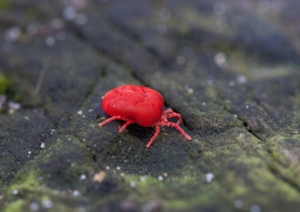
Dispelling a Common Myth About Chiggers
Have you ever played in the grass only to have red, itchy bumps immediately after? Many people attribute these bumps to a grass allergy when, in fact, they are most often caused by chigger bites. A chigger is a Trombiculidae mite in its larval stage, which is the only stage where a mite can bite. These pests need a moist environment in order to survive, which is why we commonly see them when the temperatures and humidity levels rise during the Arkansas spring and summertime.
Because they’re so tiny (1/120 to 1/150 of an inch), chances are you will never see a chigger unless you see a large cluster of them. Due to this, it has become popular belief that when a chigger bites you, it burrows under your skin and remains there, causing the red bumps you see on your skin. At Hopper Termite & Pest, we’re here to set the record straight and properly inform our customers about chiggers.
All About Chigger Bites
Unlike other members of the arachnid family and ticks, chiggers do not feed on blood meals. Instead, they feed on the skin cells of prey. They tend to hide on vegetation, which is why chiggers are commonly found in parks, yards, forests, lawns, gardens, riverbanks, and golf courses.
Because of their small stature, a chigger’s digestive system is delicate. Therefore, they prefer places on a human where the skin is thinner, including ankles, armpits, behind the knees, and the crotch and groin area. Additionally, if you’re wearing clothing that’s tight against your skin, it is more susceptible to chigger bites.
As clothing, such as pant legs or cuffs, touches any vegetation containing chiggers, they will use their legs to hook onto you and climb until they find a suitable spot on your body to feast. When chiggers bite you, they release an enzyme that enables them to break skin cells down into a liquid. When the skin first reacts to the enzyme, it hardens and creates a feeding tube which a chigger can use to feed for days if it is left undisturbed.
Chiggers do not only bite humans. They can also bite your pets. However, the good news is that chiggers cannot be passed from your dog or cat to you. Regardless, it’s important to watch out and see if your pet has recently started scratching more often.
But Do They Burrow Under the Skin?
Despite all the myths out there about chiggers burrowing under you skin when they bite you, we can confidently attest that this myth is just that—a myth. Those red bumps that occur within three to six hours after a chigger bites you are your skin’s reaction to the enzyme. In fact, your body’s inflammatory response and the itching helps you disturb the chiggers enough that they unhook from you and stop feeding.
Ways to Prevent Chigger Bites
When the weather is warm, we want to spend time outdoors enjoying the sunshine. However, the last thing you want is to return inside and be covered in an uncomfortable rash due to chiggers. Fortunately, there are multiple ways to protect yourself from their bites.
You can prevent chigger bites and/or a chigger infestation by:
- Making sure your lawn is mowed short
- Trimming any trees or shrubbery hanging in your yard or near your home
- Cutting back on vegetation near any walkways
- Wearing DEET repellant when outdoors
- Treating your shoes with Duranon
- Wearing long sleeves and pants treated with permethrin
At Hopper Termite & Pest, we also use environmentally friendly products to treat your home and effectively rid it of a chigger infestation.
To learn more about chigger control in Springdale, AR, call (870)425-4122 or contact us online today.
